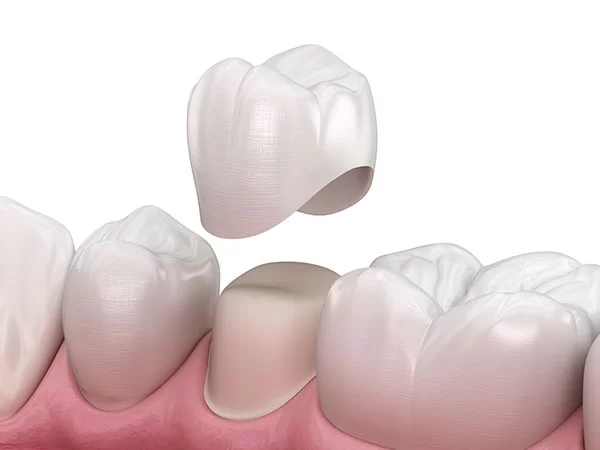Recognize When It’s Time to Restore Your Smile at Fishinger Dental
Dental crowns are a cornerstone of restorative and cosmetic dentistry, providing durable protection and enhancing your smile’s appearance. If you’re experiencing tooth pain, damage, or aesthetic concerns, recognizing the signs that you may need a dental crown can help you take timely action.
Dr. Nathan Desai, a leading dentist in Hilliard, OH, is here to guide you. Contact our Hilliard dental office today at (614) 771-6060 to schedule your consultation and restore your dental health!
Top Signs You May Need a Dental Crown
1. Persistent Tooth Pain or Sensitivity
When tooth decay or cavities progress to an advanced stage, it leads to persistent tooth pain or sensitivity. A dental crown may be necessary to restore the tooth’s structure and prevent further damage.
- Sharp or Throbbing Pain: Ongoing discomfort could signal decay that has reached the nerve. A dental crown can alleviate pain and protect the tooth.
- Temperature Sensitivity: If hot or cold foods make you wince, it may indicate a compromised tooth. Crowns provide insulation and relief from sensitivity.
2. Cracked, Fractured, or Broken Teeth
Accidents or trauma can lead to cracked or fractured teeth, compromising their strength and function.
- Visible Damage: Chips, cracks, or fractures weaken tooth structure. Dental crowns stabilize damaged teeth, restoring their strength and function.
- Pain When Chewing: Cracked teeth often cause discomfort during meals. A crown redistributes chewing pressure, preventing the crack from worsening.
- Rough Edges: Jagged tooth surfaces can irritate your tongue or cheek. A dental crown smooths the tooth’s exterior and reduces irritation.
3. Large Fillings That Are Failing
If you have older, large dental fillings:
- Signs of Wear: Fillings can loosen or crack, leaving your tooth vulnerable to further damage.
- Increased Sensitivity: A failing filling no longer insulates your tooth, causing sharp reactions to hot or cold. A crown offers long-term protection.
4. After a Root Canal
Root canal treatments leave teeth fragile and prone to damage. A dental crown is often essential to reinforce the treated tooth, ensuring longevity and functionality.
5. Worn-Down Teeth from Grinding (Bruxism)
Persistent tooth grinding, also known as bruxism, can lead to excessive wear and tear on your teeth.
- Flattened Tooth Surfaces: If your teeth look shorter or worn, it’s likely due to grinding. Dental crowns restore their natural shape and function.
- Jaw Pain or Headaches: Excessive grinding can lead to jaw pain and TMJ discomfort. Combining crowns with other therapies can protect your teeth and reduce symptoms.
6. Cosmetic Concerns: Misshapen or Discolored Teeth
Do you have misshapen or severely discolored teeth that affect your smile? Dental crowns improve the appearance of teeth that are:
- Severely Stained: If whitening treatments are ineffective, crowns provide a permanent solution.
- Uneven or Misshapen: Crowns create a uniform, natural look for a more confident smile.
7. Cracked or Worn Enamel
The outer layer of your teeth, known as enamel, is crucial for protecting the inner structures.
- Visible Cracks or Rough Edges: Worn enamel weakens the tooth’s protection, increasing the risk of decay. Crowns act as a shield to preserve your tooth.
8. Replacing Missing Teeth with a Dental Bridge or Implant
Dental crowns are essential for replacing missing teeth:
- Dental Bridges: Crowns on adjacent teeth anchor the bridge, ensuring stability.
- Dental Implant Restorations: Crowns complete dental implants, replacing missing teeth seamlessly.
Choosing the Right Dental Crown
When considering a dental crown, it’s essential to understand the different types available. Your dentist will recommend the most suitable option based on your specific needs and may be able to place the crowns in one appointment. Let’s explore some common types of dental crowns:
- Porcelain Crowns: Best for front teeth; they mimic natural enamel beautifully.
- Zirconia Crowns: Durable and resistant to chipping—ideal for long-lasting results.
- Metal Crowns: Extremely durable but more visible; suitable for molars.
- Porcelain-fused-to-metal (PFM) Crowns: Combines strength and aesthetics for versatile use.
While Fishinger Dental doesn’t offer all of these dental crown options, Dr. Desai will work with you to determine the best crown material based on your oral health, budget, and aesthetic goals.
Factors to Consider
When deciding on a dental crown, keep these key factors in mind to ensure the best outcome for your dental health:
- Longevity: While crowns are built to last, their lifespan can vary based on oral hygiene, habits, and material. Discuss longevity expectations with your dentist.
- Cost: Crown costs differ depending on the material, procedure complexity, and location. Talk to your Hilliard dentist about pricing and payment plans.
- Appearance: If cosmetic concerns are a priority, especially for front teeth, consider the aesthetic of the crown. Porcelain or all-ceramic crowns offer a natural look.
- Tooth Preparation: The degree of preparation needed varies. Some cases require minimal work, while others need more reshaping.
Why Choose Dr. Nathan Desai in Hilliard, OH?
With years of experience serving patients in Hilliard, Dublin, Upper Arlington, Grove City, and Columbus, Dr. Desai and his team offer high-quality dental care with a personal touch. Whether you need a dental crown to repair damage or enhance your smile, we prioritize:
- Advanced Technology for precise and efficient care.
- Same-Day Crowns available in many cases.
- Patient-Centered Approach tailored to your comfort and goals.
- Flexible Financing Options to make treatment accessible and stress-free.
- Convenient Location with easy access and ample parking.
Frequently Asked Questions
Which type of dental crown is best?
Choosing the right dental crown depends on your dental needs, tooth location, aesthetics, and budget. Porcelain crowns are popular for their natural look, metal crowns for durability, and porcelain-fused-to-metal (PFM) crowns for a blend of strength and appearance. Your dentist will recommend the best option for you.
How long will a tooth last without a crown?
Without a crown, a tooth that requires one may be at higher risk of damage or decay. The longevity of a tooth without a crown depends on factors such as the extent of damage, oral hygiene practices, diet, and habits like teeth grinding.
What if I don’t get a dental crown?
Choosing not to get a dental crown when needed can lead to complications. The affected tooth’s structural integrity may weaken, increasing the risk of cracks, fractures, or further decay. This may cause pain, sensitivity, or even tooth loss. It’s advisable to follow your dentist’s recommendation to maintain the tooth’s health and function.
Are there alternatives to dental crowns?
Yes, there are alternatives to dental crowns based on your dental needs. Options like dental veneers can enhance aesthetics by covering the front surface of teeth, while dental bonding uses tooth-colored resin to repair minor damage. However, these may not suit all situations, so your dentist will recommend the best treatment for you.
Don’t Wait—Restore Your Smile Today!
Ignoring dental issues can lead to more extensive damage or even tooth loss. If you’re experiencing any of the signs mentioned above, Dr. Desai is here to help.
Call us today at (614) 771-6060 to schedule your consultation. Let’s keep your smile strong, healthy, and beautiful! We proudly serve patients in Hilliard, Columbus, Dublin, Upper Arlington, Grove City, and surrounding areas.








